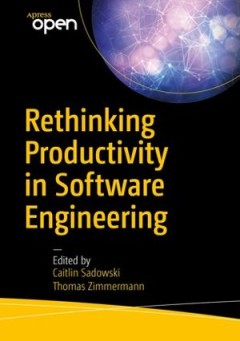Filter by

Agile Processes in Software Engineering and Extreme Programming: 18th Interna…
This book is open access under a CC BY license. The volume constitutes the proceedings of the 18th International Conference on Agile Software Development, XP 2017, held in Cologne, Germany, in May 2017. The 14 full and 6 short papers presented in this volume were carefully reviewed and selected from 46 submissions. They were organized in topical sections named: improving agile processes; agil…
- Edition
- -
- ISBN/ISSN
- 9783319576336
- Collation
- XIII, 306
- Series Title
- 283
- Call Number
- -

Rethinking Productivity in Software Engineering
Get the most out of this foundational reference and improve the productivity of your software teams. This open access book collects the wisdom of the 2017 "Dagstuhl" seminar on productivity in software engineering, a meeting of community leaders, who came together with the goal of rethinking traditional definitions and measures of productivity. The results of their work, Rethinking Productivity…
- Edition
- -
- ISBN/ISSN
- 9781484242216
- Collation
- XXVIII, 310 hlm,: ill, lamp;
- Series Title
- -
- Call Number
- -

Developing Sustainable and Energy-Efficient Software Systems
This open access book provides information how to choose and collect the appropriate metrics for a software project in an organization. There are several kinds of metrics, based on the analysis of source code and developed for different programming paradigms such as structured programming and object-oriented programming (OOP). This way, the book follows three main objectives: (i) to identify ex…
- Edition
- -
- ISBN/ISSN
- 978-3-031-11658-2
- Collation
- XI, 77
- Series Title
- SpringerBriefs in Computer Science (BRIEFSCOMPUTER)
- Call Number
- 001 KRU d

Fundamental Approaches to Software Engineering: 24th International Conference…
This open access book constitutes the proceedings of the 24th International Conference on Fundamental Approaches to Software Engineering, FASE 2021, which took place during March 27–April 1, 2021, and was held as part of the Joint Conferences on Theory and Practice of Software, ETAPS 2021. The conference was planned to take place in Luxembourg but changed to an online format due to the COVID-…
- Edition
- 1
- ISBN/ISSN
- 9783030715007
- Collation
- XIV, 373
- Series Title
- -
- Call Number
- -

Computer Aided Verification: 32nd International Conference, CAV 2020, Los Ang…
he open access two-volume set LNCS 12224 and 12225 constitutes the refereed proceedings of the 32st International Conference on Computer Aided Verification, CAV 2020, held in Los Angeles, CA, USA, in July 2020.* The 43 full papers presented together with 18 tool papers and 4 case studies, were carefully reviewed and selected from 240 submissions. The papers were organized in the following topi…
- Edition
- 1
- ISBN/ISSN
- 9783030532918
- Collation
- XVIII, 683
- Series Title
- -
- Call Number
- -

Computer Aided Verification: 32nd International Conference, CAV 2020, Los Ang…
The open access two-volume set LNCS 12224 and 12225 constitutes the refereed proceedings of the 32st International Conference on Computer Aided Verification, CAV 2020, held in Los Angeles, CA, USA, in July 2020.* The 43 full papers presented together with 18 tool papers and 4 case studies, were carefully reviewed and selected from 240 submissions. The papers were organized in the following t…
- Edition
- 1
- ISBN/ISSN
- 9783030532888
- Collation
- XVII, 669
- Series Title
- -
- Call Number
- -

Computer Aided Verification: 31st International Conference, CAV 2019, New Yor…
This open access two-volume set LNCS 11561 and 11562 constitutes the refereed proceedings of the 31st International Conference on Computer Aided Verification, CAV 2019, held in New York City, USA, in July 2019. The 52 full papers presented together with 13 tool papers and 2 case studies, were carefully reviewed and selected from 258 submissions. The papers were organized in the following top…
- Edition
- 1
- ISBN/ISSN
- 9783030255404
- Collation
- XIX, 673
- Series Title
- -
- Call Number
- -

Computer Aided Verification: 31st International Conference, CAV 2019, New Yor…
The open access two-volume set LNCS 11561 and 11562 constitutes the refereed proceedings of the 31st International Conference on Computer Aided Verification, CAV 2019, held in New York City, USA, in July 2019. The 52 full papers presented together with 13 tool papers and 2 case studies, were carefully reviewed and selected from 258 submissions. The papers were organized in the following to…
- Edition
- 1
- ISBN/ISSN
- 9783030255435
- Collation
- XX, 549
- Series Title
- -
- Call Number
- -

Fundamental Approaches to Software Engineering: 23rd International Conference…
This open access book constitutes the proceedings of the 23rd International Conference on Fundamental Approaches to Software Engineering, FASE 2020, which took place in Dublin, Ireland, in April 2020, and was held as Part of the European Joint Conferences on Theory and Practice of Software, ETAPS 2020. The 23 full papers, 1 tool paper and 6 testing competition papers presented in this volume w…
- Edition
- 1
- ISBN/ISSN
- 978-3-030-45234-6
- Collation
- XIII, 552
- Series Title
- -
- Call Number
- -

Fundamental Approaches to Software Engineering: 21st International Conference…
Buku ini merupakan hasil dari Konferensi Internasional ke-21 tentang Pendekatan Fundamental terhadap Rekayasa Perangkat Lunak, FASE 2018, yang berlangsung di Thessaloniki, Yunani pada bulan April 2018, yang diselenggarakan sebagai Bagian dari Konferensi Gabungan Eropa tentang Teori dan Praktik Perangkat Lunak, ETAPS 2018. Sebanyak 19 makalah yang disajikan dalam volume ini telah ditinjau dengan…
- Edition
- 1
- ISBN/ISSN
- 978-3-319-89363-1
- Collation
- XII, 357
- Series Title
- -
- Call Number
- 005.1 RUS f
 Computer Science, Information & General Works
Computer Science, Information & General Works  Philosophy & Psychology
Philosophy & Psychology  Religion
Religion  Social Sciences
Social Sciences  Language
Language  Pure Science
Pure Science  Applied Sciences
Applied Sciences  Art & Recreation
Art & Recreation  Literature
Literature  History & Geography
History & Geography